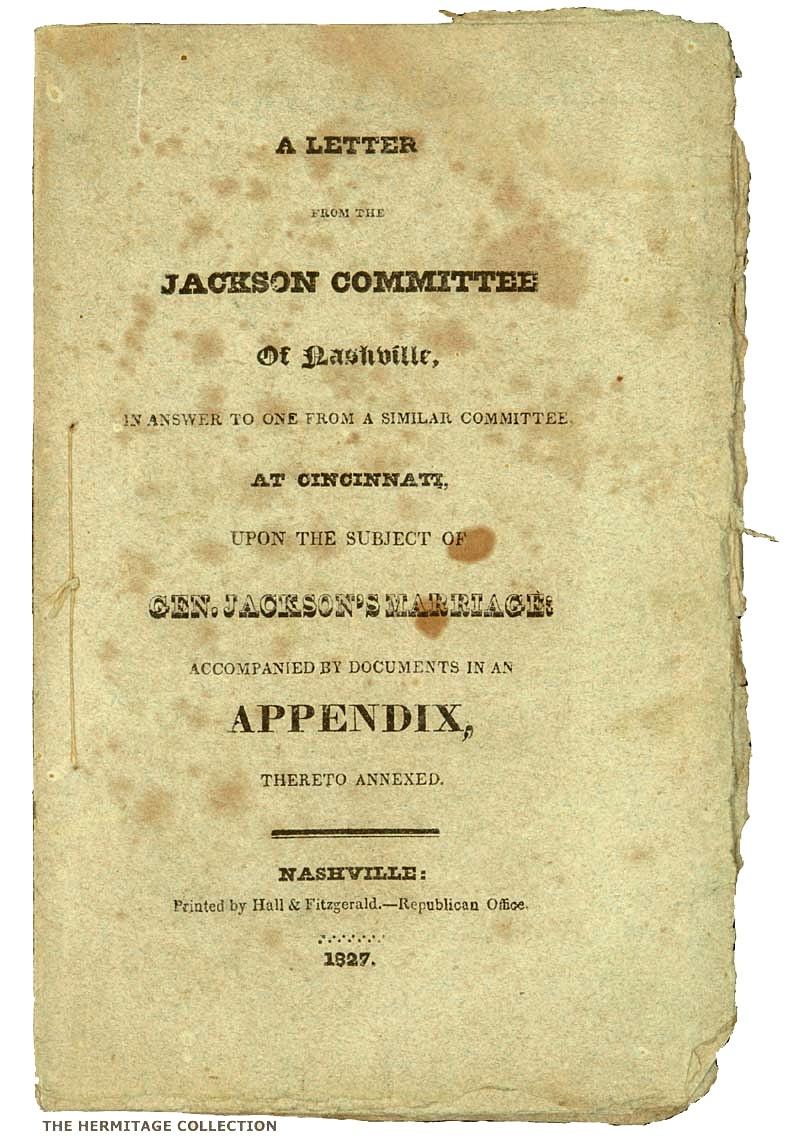
Jackson's Perspective | Rachel's First Marriage and Divorce

The Jackson Campaign Responds to Accusations
In 1828, Andrew Jackson's campaign organized what is considered the first political public relations enterprise to respond to accusations from his political rivals regarding his "domestic relations in reference to his fitness for the presidency." It was called the Nashville Central Committee and played a large role in getting him elected. Many of Jackson's detractors claimed he was not fit for the presidency based on his character flaws, including his domestic behavior stemming from the unusual circumstances regarding his wife's first marriage.
The complete written response from the Nashville Central Committee, called "A Letter from the Jackson Committee of Nashville" was prepared and written by Robert Coleman Foster. It was thirty pages long and incorporated testimony from many different sources, including a large contribution from longtime friend, law partner and campaign contributor Judge John Overton.
"When in Rage, Lewis Robards abandoned his
wife and stormed back to Kentucky it was
'really his determination'. never to return or
live with his wife again, but to desert her forever.' "
Judge Overton's Narrative
The following are excerpts from Judge Overton's narrative, used as a main source for the written response as well as the timeline of events:
"In the fall of 1787, I became a boarder in the family of Mrs. Robards, the mother of Lewis Robards, in Mercer county, Kentucky. Captain Robards and his wife then lived with old Mrs. Robards. I had not lived there many weeks before I understood that Captain Robards and his wife lived very unhappily, on account of his being jealous of Mr. Short."
"The uneasiness between Captain Robards and lady continued to increase, and with it great distress of the mother, and considerably with the family generally; until early in the year 1788, as well as now recollected, I understood from the old lady, and perhaps others of the family, that her son Lewis had written to Mrs. Robards' mother, the widow Donelson, requesting that she would take her home, as he did not intend to live with her any longer."
"In unreserved conversations with me, the old lady always blamed her son Lewis, and took the part of her daughter-in-law."
Footnotes:
Robert V. Remini, Andrew Jackson, Volume One, The Course of the American Empire, 1767-1821 (Baltimore: Johns Hopkins University Press, 1998) p. 57.
James Parton, The Life of Andrew Jackson, Volume III (New York: Mason Brothers, 1861) p. 148.
Sources:
James Parton, The Life of Andrew Jackson, Volume III (New York: Mason Brothers, 1861)
Robert V. Remini, Andrew Jackson, Volume One, The Course of the American Empire, 1767-1821 (Baltimore: Johns Hopkins University Press, 1998) Chapter 5, "Marriage"